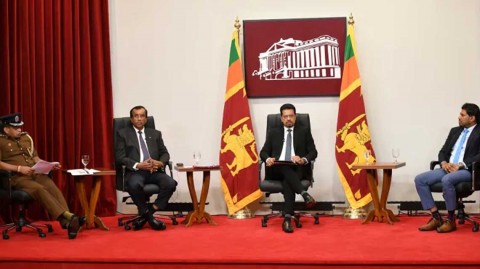
– Litro Gas Limited Chairman
Litro Gas Limited Chairman Theshara Jayasinghe said that there is no change in the composition of Litro Gas and steps have been taken to obtain recommendations from foreign experts in this regard and that the people should not have any undue fear when using LP (Liquefied Petroleum) Gas.
The Chairman said this while speaking at a media briefing organised by the Presidential Media Center today (20). President’s Media Spokesman Kingsly Rathnayaka moderated the media briefing.
Though some factions have suggested that the cause of the gas leaks and explosions was a change in the composition of the gas, it has now been confirmed that none of the incidents reported so far have been caused by a change in the composition of LP gas. The Chairman of Litro Gas Limited said that the company has agreed to provide an insurance cover of one million rupees per person if such an incident is reported due to the standard of the gas.
Recommendations with SLS certification for the standards of LP gasses have now been issued, and the liquid gas composition is a mixture of 70% butane and 30% propane. The Chairman said steps have been taken to display “Propane Max 30% Vol” in print on gas cylinders from today.
Technology Ministry Secretary Jayantha De Silva said the investigations carried out in many parts of the country have revealed that the equipment used for the gas stoves, including the regulator, are substandard. He added that a lasting solution will be provided to the issue by enabling the people to purchase the equipment with required standards within the next three months.
The Secretary said the responsibility for the standards of the equipment will also be handed over to the two major gas companies in the future and plans are afoot to immediately minimize the impact of the situation as per the instructions of the President.
The Secretary to the Ministry also stated that all further steps will be taken in accordance with the recommendations of the Presidential Committee appointed to look into the recent incidents of LP Gas cylinder fires and explosions.
Litro Gas Limited Chairman Theshara Jayasinghe said that LP gas approved by the Sri Lanka Accreditation Board will be released to the market without any shortage during the upcoming festive season and added that the people should not fear a gas shortage.
Responding to questions by the journalists whether legal action would be taken against the relevant companies over incidents of gas leaks and explosions as well as in terms of reparations, Senior DIG Deshabandu Tennakoon said that the Government Analysts have conducted comprehensive investigations into such incidents.
Accordingly, SDIG Tennakoon said that it has been reported that the majority of incidents have occurred due to substandard gas stove equipment and improper use of such equipment. Therefore, he said that there is no cause of action as it has not been scientifically proven that these were conducted with a criminal intention.
The public was also requested to purchase quality gas stoves and equipment upto the standard from responsible institutions.
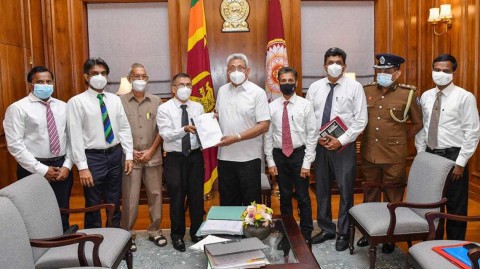
The final report of the Committee appointed to look into the recent incidents of Liquefied Petroleum Gas (LPG) cylinder fires and explosions, was handed over to President Gotabaya Rajapaksa by its Chairman Prof. Shantha Walpola, today (20).
The Committee was appointed by the President on November 30 to look into the recent incidents of Liquefied Petroleum Gas (LPG) cylinder fires and explosions that occurred at domestic, commercial, and sales outlets in various parts of the country and to find possible causes of the problem in order to provide immediate solutions to the issue.
Accordingly, the Committee has prepared this report taking into account investigations carried out in 11 institutions including the on-site inspections and inquiries conducted on two major LPG gas companies, Litro and Laughs Gas, an inspection of 17 places where fires and explosions occurred and considering the views received by e-mails.
The Committee chaired by Prof. Shantha Walpola, University of Moratuwa also includes Senior DIG Deshabandu Tennakoon, Prof. Ajith De Alwis, University of Moratuwa, Prof. W.D.W. Jayathilaka, University of Sri Jayewardenepura, Prof. Pradeep Jayaweera, Prof. Narayan Sirimuthu, Commissioner of the Sri Lanka Inventors Commission, Dr. Sudarshana Somasiri, Additional Director General of the Technical Services and Sujeewa Mahagama, Senior Deputy Director of Sri Lanka Standards Institution as other members.
The assistance of Dr. Saliya Jayasekara of the University of Moratuwa was also obtained in this regard.
The Chairman of the Committee Prof. Shantha Walpola said that a comprehensive report has been prepared under two main factors of ascertaining incidents and finding root causes of accidents on the investigation of gas cylinder fires and explosions.
The Chairman also stated that the report of the Committee has presented Short-Term and Long-Term measures that should be taken to overcome the current situation.
Secretary to the President P.B. Jayasundera, Secretary to the Ministry of Technology Jayantha de Silva and Members of the Committee were also present.
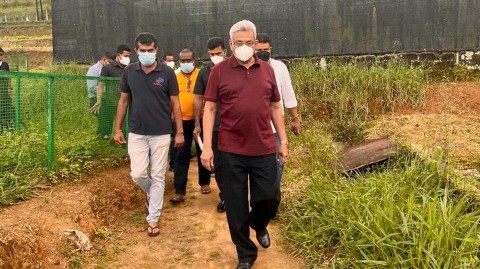
President Gotabaya Rajapaksa yesterday (18) inspected the Plant Tissue Culture Center and Mushroom Seed Production Unit at Bindunuwewa in Bandarawela which are managed by the Uva Provincial Department of Agriculture.
The center grows tissues of flower plants and fruit plants including banana and mango. The Center also facilitates the educational research activities of university Faculties of Agriculture and school children.
A Model Farm is also maintained at the site to train agricultural research officers and to provide necessary technical and practical knowledge to farmers in the province.
President Rajapaksa who inspected the model farm which was managed using organic fertilizer instructed the relevant officials to expand the services provided at the center, including the production of organic fertilizer.
Badulla District Parliamentarian Sudarshana Denipitiya and Army Commander General Shavendra Silva were also present at the occasion.
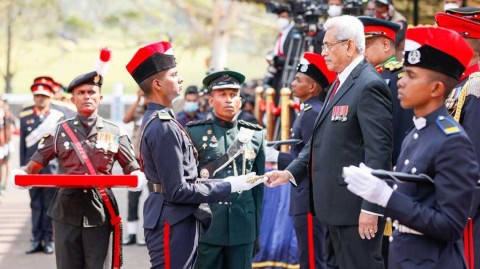
“Discipline of the highest degree is one of the most important aspects in a military officer’s life. Optimism, self-belief, and confidence in yourself and those in your teams will be at the heart of your success,” said President Gotabaya Rajapaksa.
The President made these remarks while participating at the 96th Commissioning Parade of the Sri Lanka Military Academy, Diyatalawa held today (19).
“The attention you pay to simple tasks builds discipline, it fosters attention to detail, and it provides a sense of accomplishment, no matter how small, as you start your day. There will be many situations in your life where no matter how capable or skilled you are as an individual, you will not be able to succeed without the support of others,” the President further said.
“Someday, one of you may even become the Commander of the Army and be responsible for the entire organization and all the people in it. As you start on this journey, you must understand that the soldiers under your command are ordinary people, and not supermen. It is your responsibility to ensure that you get outstanding results from such normal people,” President Rajapaksa added.
The President pointed out that setbacks are part of the journey and the leader should be able to face them successfully and make bold decisions.
President Rajapaksa upon arrival, paid floral tribute to the fallen heroes at the Monument of Peace and observed the Commissioning Parade.
A total of 316 officer cadets from Intake 5 passed out today.
The group includes 73 students who entered the Sri Lanka Military Academy (SLMA) to pursue Bachelor’s Degree in Military Studies, 150 graduates from General Sir John Kotelawala Defence University, 61 volunteer cadet officers, 15 volunteer female cadet officers, six trained cadet officers from Zambia, Maldives and Rwanda and five Sri Lankan cadets trained in India, Pakistan, Bangladesh and Nepal.
President’s Award for the First in Order of Merit for Volunteer Lady Officer Cadet Intake 17 was awarded to H.A.T. Prabhashwari by President Rajapaksa while President’s Award for the First in Order of Merit for Volunteer Officer Cadet Intake 60 and the Sword of Honour for the Best All-Round Officer Cadet was awarded to A.M.D.T.N. Perera. Meanwhile, the President’s Award for the First in Order of Merit for Regular Officer Cadet Intake 89B was awarded to R.T.L.A. Silva, the Sword of Honour for the Best All-Round Officer Cadet of Regular Officer Cadet Intake 89B to H.E.A. Ranjula and the President’s Award for the First in Order of Merit for Regular Officer Cadet Intake 90 and the Sword of Honour for the Best All-Round Officer Cadet of Regular Officer to T.R.C.D. Pathinayake. The President’s Award for the First in Order of Merit and the Sword of Honour for the Best All-Round Officer Cadet for the Regular Officer Cadet Intake 89 was awarded to D.M.M. Rukshan while the Staff of Honour for Best Foreign Cadet Officer was awarded to A. Adam of Maldives.
The President planted a sapling to mark his participation and appeared in several group photos.
Principal Advisor to the President Lalith Weeratunga, Defence Secretary General Kamal Gunaratne, Chief of Defence Staff and Commander of the Army General Shavendra Silva and other senior Army officers were also present.
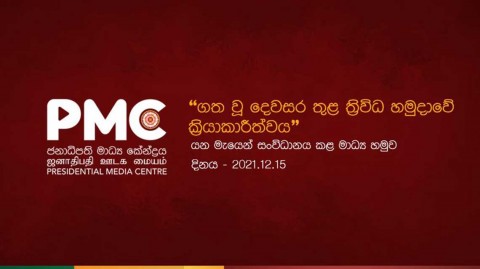
The Secretary of Defence, General Kamal Gunaratne, says that Sri Lanka Armed Forces have played a vital role in ensuring national security as well as nation building process over the past two years.
The Defence Secretary expressed these views while speaking at a media briefing organised by the Presidential Media Centre this morning (15) on the activities of the three armed forces during the past two years. President’s Media Spokesman Kingsly Rathnayaka moderated the media briefing.
Defence Secretary Gunaratne said the country’s national security has been ensured and there is no room for separatism, and also added that no Sri Lankan should have any undue fear. He also said that the state intelligence service and other intelligence services are being operated as a strong single network today.
The freedom that war heroes made available in the country by sacrificing their lives and the national security of the country was turned upside down following the Easter Sunday attack. The Secretary of Defence said that the investigations were not carried out properly during the previous government’s tenure and said all necessary assistance will be provided to the judiciary in order to bring justice to the innocent families affected by the Easter Sunday attack.
Responding to a question on whether the country was being militarized, Defence Secretary Gunaratne said a few retired army officers holding government posts was not a sign of militarisation and asked whether it would be wrong for a retired military officer to use his years of knowledge and experience to serve the country and the people.
It is the responsibility of the Armed Forces to ensure the national security of the country as well as to take the necessary steps to build the nation. The Defence Secretary pointed out that the Army, Navy and Air Force are playing a major role in this regard.
Explaining the role of the Sri Lanka Army in the development of the country during the past two years, Brigadier Nilantha Premaratne, Media Director at the Army Headquarters said that the Sri Lanka Army contributed to the development of the country using its maximum capacity.
At the same time, the Sri Lanka Army has made a significant contribution to the Covid-19 control programme. Brigadier Premaratne said that the Army is making an immense contribution in maintaining treatment centres, quarantine centres as well as intermediate treatment centres under the guidance of the Army Commander. The Army was also instrumental in developing the infrastructure facilities to meet the needs of the people.
Captain Indika De Silva, Media Director, Navy Headquarters, said that the Sri Lanka Navy also has a great role to play as the Navy of an island nation.
Captain De Silva said the Sri Lanka Navy has seized more than Rs. 35 billion worth of illicit drugs in the last two years alone and as the nation’s foremost defence line, it had done a great service to the country and the future of the youth.
At the same time, the Civil Engineering Division of the Sri Lanka Navy has been providing an extensive contribution to the construction sector. The Navy is also committed to uphold the welfare of the people and has implemented several projects to provide clean drinking water facilities to the people. Captain Indika De Silva said that the Sri Lanka Navy is working to ensure the safety of the Coastal Ecological Zone as well as to conserve mangroves.
He said that the Sri Lanka Navy is also actively involved in controlling the Covid-19 virus spread and the management of the vaccination drive of the country.
Sri Lanka Air Force Media Director Group Captain Dushan Wijesinghe also expressed his views. With the spread of Covid 19, the Sri Lanka Air Force was committed to cleaning and disinfecting operations as well as contributed to launch environmental conservation projects including aerial seeding for protected areas in order to increase the forest cover of Sri Lanka as mentioned in ‘Vistas of Prosperity and Splendour’ policy statement. He further said that the Sri Lanka Air Force is also actively contributing to a joint project with the Sri Lanka Police to reduce urban traffic congestion.

A meeting between the leader of the Bohra community, His Holiness Dr. Syedna Mufaddal Saifuddin Saheb, and President Gotabaya Rajapaksa took place at the President’s private residence in Mirihana this morning (11).
Nearly one million members of the Bohra community live in a number of countries including India, Pakistan, the United States, the United Kingdom, Canada, Sri Lanka and Australia. His Holiness Saifuddin said he was pleased to visit Sri Lanka which is one of the countries he loves and added that he would continue to visit Sri Lanka along with his followers.
He praised the government’s Covid-19 control programme and said that he looks forward to the development of Sri Lanka.
President Rajapaksa thanked the Bohra Community Leader for his contribution made to the ‘Itukama’ Covid-19 Fund and appreciated the contribution made by the Bohra community to the Sri Lankan economy through investment and trade.
Principal Advisor to the President Lalith Weeratunga and several leading members of the Bohra community were also present at the meeting.
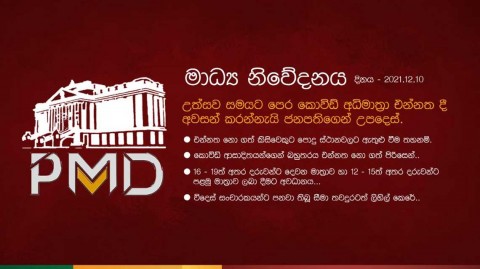
- Unvaccinated people are not allowed to enter public places…
- Majority of Covid patients are unvaccinated…
- Second dose for children between 16 – 19 years…
- Attention paid to administer first dose to children between 12 and 15…
- Restrictions on tourists further relaxed…
President Gotabaya Rajapaksa instructed the members of the Special Committee on COVID-19 Control to take necessary steps to complete administering booster doses within the next two weeks to control the spread of COVID-19 during the upcoming festive season.
The President made these remarks during the meeting of the Special Committee on COVID-19 Control held at the Presidential Secretariat, today (10).
All those who have completed 03 months after receiving the second dose are eligible to receive the Pfizer vaccine as the booster dose. Accordingly, eligible persons have the opportunity to receive the Pfizer vaccine from tomorrow at any vaccine centre.
Observations have revealed that the vast majority of confirmed cases of COVID-19 reported these days are from among those who have not been vaccinated and most of them are youngsters, the health officials said. Vaccination is mandatory to minimize the number of covid-19 patients in intensive care as well as to reduce mortality rate. The President gave instructions to educate the youth in this regard and then to take steps to provide the vaccine as soon as possible.
Legal advice has been sought with regard to preventing those who have not obtained the vaccine from entering public places in order to prevent the spread of Covid-19. Taking this into consideration, the Special Committee on COVID-19 Control today decided to make the vaccination card mandatory when entering public places in the future.
The approval has been received to administer the second dose for children between the ages of 16 and 19 and the first dose for all children between the ages of 12 and 15. Accordingly, the President instructed to devise plans in collaboration with the Ministry of Education to immediately provide the vaccine.
The arrival of foreign tourists has increased. The Airlines have increased the number of flights. The President also instructed to further relax the restrictions imposed on tourism, taking into account the development of the tourism sector.
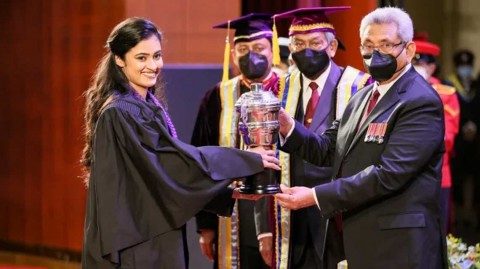
– President emphasizes
- There is no reason why universities should only be state universities…
- The higher education sector in Sri Lanka should be converted into a foreign exchange revenue generator …
“There is a mismatch between the education generally on offer in Sri Lanka and what is necessary for our country to develop in the 21st Century. This is why I have constantly called for educational reforms, especially in our tertiary education system’’ said President Gotabaya Rajapaksa addressing the General Convocation of Sir John Kotelawala Defence University held at the BMICH, today (09).
‘I strongly believe that no matter the degree programme followed by university students, they must all graduate having gained at least some proficiency in information technology. They should also receive exposure to other skills necessary for success in today’s world, including critical thinking, entrepreneurship, and English language skills’ the President further said.
‘I am pleased to note that several of these reforms have already been implemented by our universities, and that more are to be introduced next year. One of the early accomplishments of my administration was increasing the number of places for students in universities throughout Sri Lanka by ten thousand’, President Rajapaksa added.
‘Even with this increase, however, there will still be thousands of students who cannot access university education in Sri Lanka despite passing their Advanced Level examinations. This is because there just isn’t enough capacity within the state university system to accommodate all qualifying students. We need to create more opportunities for our young people to study at universities in Sri Lanka.There is absolutely no reason why these universities should only be state universities. Almost all the best universities in the world are not state universities. Most are structured as independent self-governing entities, charitable institutions, or nonprofit organizations focused on education’, President Rajapaksa said.
‘The old objections about higher education institutions outside the state universities being education shops that sell degrees is nonsensical’, the President further said.
This was the 32nd General Convocation of Sir John Kotelawala Defence University.
One PhD Graduand, 227 Master’s Graduands and Postgraduate Diploma holders from the Faculty of Graduate Studies, and 1180 Bachelor’s Degree holders from different faculties of KDU were among the 1408 graduands who received parchments at this year’s convocation.
President Rajapaksa presented special awards to Cadet Officer S.H. Rodrigo as the Best Army Officer, Lieutenant S.D Karunasena as the Best Naval Officer, Fg Off S.K.S. Rukshan as the Best Air Force Officer. The sword of Honour for the Best All-Round Performance of Intake 34 was awarded to Lt L.D.I. Liyanaarachchi.
The General Sir John Kotelawala Defence University was established in 1981 to meet the educational needs of the officers of the three Armed Forces. It was elevated into a fully-fledged University in 2009 by then Defence Secretary Gotabaya Rajapaksa. In 2009, civilian students were granted the opportunity to study there. At present, members of the three Armed Forces and local and foreign students can pursue doctoral, postgraduate and postgraduate diploma courses at the University.
Kotelawala Defence University is currently a member of the Association of Commonwealth Universities and the International Association of Universities as a world-recognized university.
Minister Keheliya Rambukwella, Ambassadors and High Commissioners, Defence Secretary and Secretaries of other ministries, Chief of Defence Staff and Commanders of the Armed Forces, the Inspector General of Police, Director General of the Civil Defence Force and other Heads of the Security Sector, Chancellor of General Sir John Kotelawala Defence University General Gerard de Silva, Vice Chancellor Major General Milinda Peiris and the members of the academic and non-academic staff were also present.
Speech for the KDU General Convocation
Chancellor of the General
Sir John Kotelawala Defence University, General
Gerard de Silva ,
Hon. Ministers,
Secretary, Ministry of Defence and Other secretaries of Ministries,
Vice Chancellor Major General Milinda Pieris ,
High Commissioners and Ambassadors,
Chief of Defence Staff and Commander of the Army,/ the Navy,/ and the Air Force,
Inspector General of Police,
Members of the Board of Management,
Members of the Academia ,
Distinguished Guests,
Parents and Graduates,
I am delighted to address you this afternoon at the General Convocation of the General Sir John Kotelawela Defence University.
I congratulate all students graduating at this event on their hard work during their studies and wish them all success in their future careers.
The General Sir John Kotalawela University is a unique institution in Sri Lanka.
Initially established to provide further training to officers in the Sri Lankan military, the KDU now offers many tertiary educational qualifications to civilians as well as Armed Forces personnel.
It also attracts students from overseas for several degree programmes.
Today, the General Sir John Kotelawela Defence University is reputed as one of Sri Lanka’s finest tertiary educational institutions, producing graduates who are extremely competent in their chosen disciplines.
The KDU’s graduates are renowned for their leadership skills, teamwork skills, integrity, and patriotism, and are in high demand amongst employers.
As those involved in this institution can attest, developing the KDU to become an institution of this stature was not without its challenges.
Even today, there are objections raised against the KDU by certain groups.
These groups want to undo the good work that has been done here over the years, which has already benefitted thousands of Sri Lankan students.
I do not understand this attitude, which has held back Sri Lanka’s education system for decades.
It is no secret that our country’s education system has not kept pace with the requirements of today’s world.
There is a mismatch between the education generally on offer in Sri Lanka and what is necessary for our country to develop in the 21st Century.
This is why I have constantly called for educational reforms, especially in our tertiary education system.
I strongly believe that no matter the degree programme followed by university students, they must all graduate having gained at least some proficiency in information technology.
At minimum, they should have had the opportunity to gain some experience in working with computers.
They should also receive exposure to other skills necessary for success in today’s world, including critical thinking, entrepreneurship, and English language skills.
I am pleased to note that several of these reforms have already been implemented by our universities, and that more are to be introduced next year.
I hope that these reforms will equip our university students with the skills and aptitudes they need in order to be productive citizens after they graduate.
An even larger problem concerning Sri Lanka’s education system, however, is its extreme capacity constraint.
One of the early accomplishments of my administration was increasing the number of places for students in universities throughout Sri Lanka by ten thousand.
Even with this increase, however, there will still be thousands of students who cannot access university education in Sri Lanka despite passing their Advanced Level examinations.
This is because there just isn’t enough capacity within the state university system to accommodate all qualifying students.
The consequences of this lack of university places are much wider than most people realise.
It has led to a constant narrowing of opportunities throughout the entire education system.
It has almost resulted in the system being designed with more intent to fail students than to help them succeed.
We see this in the large numbers who sit for their Ordinary Level examinations, but do not qualify to study at the Advanced Level.
We see this in the large numbers who travel abroad each year to obtain their university education in other countries.
Not only do the parents of these students incur a high cost by doing so, but the country loses valuable foreign exchange, and most worryingly, it is deprived of many outstanding young people who will most likely continue to live abroad instead of returning to Sri Lanka after graduation.
Students who have less affluent parents end up following various other courses, which may be taught in Sri Lanka but nevertheless do not provide the holistic education that universities do.
The majority simply drop out of further education altogether and end up taking whatever low paying jobs they can find.
Worst of all, because of the high esteem in which university education is held in our country, these students may feel like failures for years to come, if not for the rest of their lives.
Continuing with this cruel status quo is simply unacceptable.
We need to create more opportunities for our young people to study at universities in Sri Lanka.
There is absolutely no reason why these universities should only be state universities.
Almost all the best universities in the world are not state universities.
Most are structured as independent self-governing entities, charitable institutions, or nonprofit organizations focused on education.
There is absolutely no reason why such institutions cannot be established in Sri Lanka.
If the legal framework needs to be changed to make this possible, that can be done.
If traditional attitudes are preventing such institutions from being established, those must be strongly challenged.
The old objections about higher education institutions outside the state universities being education shops that sell degrees is nonsensical.
We need to think beyond this tired old rhetoric from a past era, which is being cynically used to limit opportunities for our young people.
If we do not do this now, many more generations of students will needlessly suffer because of these parochial attitudes.
I am not prepared to let this happen.
The fact that students may pay for their studies at universities established outside the public sector does not mean that those institutions sell degrees.
Objecting to the establishment of universities outside the public sector on such flimsy grounds is not just tragic; it is a crime.
It should be the role of the University Grants Commission to regulate and maintain the standard of all universities, irrespective of whether they are state funded or self-funded.
Furthermore, if any university that charges a fee does not maintain its quality, it will die an organic death in time anyway.
Students will not attend universities unlikely to give them opportunities in the job market after graduation.
As attendance drops off, any university that does not maintain its standards will cease to operate.
If anything, allowing the establishment of more universities in Sri Lanka will create more competition amongst such institutions for students at all levels as well as for lecturers and professors.
Those who object vehemently to the establishment of more universities in Sri Lanka lack confidence in their ability to succeed in such a competitive environment.
The sooner their objections are overcome, and these new opportunities are created, the better off our students and our country shall be.
If we have a diverse and competitive tertiary education system in Sri Lanka that goes beyond what is currently provided by state universities, it might even encourage students who can afford to study abroad, or those who win scholarships to universities in other countries, to remain here.
Establishing a freer environment for tertiary education in the country could also attract world class regional higher educational institutions into Sri Lanka, further enhancing the quality of education on offer here.
This will also help Sri Lanka attract students from regional countries including India, Pakistan, Bangladesh, and even from countries further away.
In time, this will transform higher education in Sri Lanka into a viable foreign exchange revenue generator for the economy.
It is unfortunate that Sri Lanka is already decades behind other countries in allowing this to happen.
However, it is still not too late to make this change.
This broad change in its higher education structure is exactly what Sri Lanka needs if it is to develop rapidly and become a prosperous nation in the future.
We must create new opportunities for our best and brightest without limiting ourselves to the status quo because of past practices, traditions, or outdated laws and regulations.
I hope that all of you present here today will understand this reality and do your best to support this change in time to come.
Let us all work together to build a better tomorrow for our country and for our future generations.
Thank you.
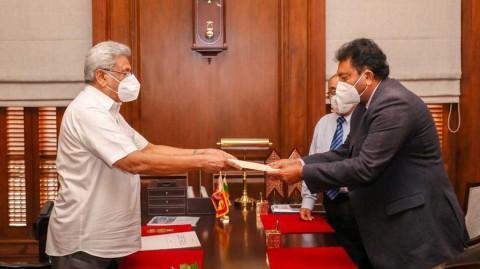
Admiral of the Fleet Wasantha Karannagoda was sworn in as the new Governor of the North Western Province before President Gotabaya Rajapaksa at the Presidential Secretariat, today (09).
Wasantha Karannagoda rendered a great service to the Motherland during the humanitarian operation as the Commander of the Navy. He has previously served as Sri Lanka’s Ambassador to Japan.
Admiral of the Fleet Wasantha Karannagoda has been appointed as the new Governor of the North Western Province following the demise of former Governor Raja Collure.
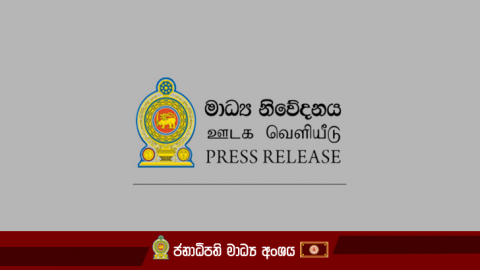
The Presidential Task Force for ‘One Country, One Law’ received a warm response from the people of the Eastern Province.
The Presidential Task Force held public consultations in Batticaloa Divisional Secretariat and the Valachchenai Divisional Secretariat Auditorium, yesterday (04).
Buddhist monks, priests, professionals, and social activists expressed their views on the problems that have existed in the area for a long time. Proposals were submitted to the Committee orally and in writing.
They said that the holding of public consultations in the Eastern Province by the Presidential Task Force for ‘One Country, One Law’ is an honour for them.
The members of the Task Force were taken to several religious places of worship in the area including Baduria Jummah Mosque – Kattankudy – 06, Kalmunai Mosque and Kadatkarai Mosque and exchanged views in a cordial manner. Special religious rituals were conducted to invoke blessings.
The Chairman of the Presidential Task Force Rajakiya Panditha Ven. Galagodaaththe Gnanasara Thera stated that the current President is making a sincere effort to find a solution to the long standing problems. The Thera further said that all religious leaders, including Buddhist monks, Tamil religious leaders, Muslim Moulavis and Christian priests, who desired to achieve real peace and reconciliation, should take the lead in calling for ‘One Country, One Law’. Gnanasara Thera also emphasized that the sufferings we experience today should not be passed on to future generations.
The Presidential Task Force headed by Ven. Galagodaaththe Gnanasara Thera which was appointed by President Gotabaya Rajapaksa to forward proposals on implementing the ‘One Country – One Law’ concept in Sri Lanka after studying and taking into consideration the opinions and views expressed by various parties on the concept, began public consultations from the Northern Province.
The public consultations in the Eastern Province which was held for three days comes to an end today. The views and opinions of the people in the other Provinces will be sought in the coming days.
The Secretary to the Task Force Ms. Jeevanthie Senanayake and other members of the Task Force Prof. Shanthi Nandana Wijesinghe, Senior Lecturer Sumedha Weerawardena, Attorney at Law Sanjaya Marambe, Eranda Navaratne, Pani Wewala, Aiyam Pillai, Dayananda Raja, Yogeswari Patgunarajah and Attorney at Law Iresh Seneviratne were also present.


